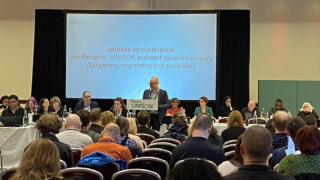All staff working in higher education – including those who have been contracted out – should be paid the living wage, UNISON demanded today.
Preparing for its higher education conference, taking place today in Manchester, the union said the economic and social arguments for paying the living wage to higher education staff could no longer be ignored.
Jon Richards, UNISON head of education, said: “The higher education sector has recently been described as ‘cash rich’. Well it’s time to share some of those riches, and it’s time they treated their staff fairly.
“Paying the living wage to staff in higher education is in everyone’s interests; the employer, the individual, and for the community as a whole. Not only will it improve the quality of life for those staff who, on the minimum wage, are amongst the lowest earners in society, it will put more money in people’s pockets and therefore into the economy. Research has shown that employers paying the living wage gain improvements in recruitment, retention and absenteeism.
“Our campaign is building and increasingly higher education employers are falling in line and paying the living wage to staff, but there is still work to be done. It’s time for the employers to wake up to the economic and social benefits of paying a decent, living wage to the staff that keep the higher education sector going.”
UNISON has waged a long campaign to get employers in the public and private sectors to make the living wage – £8.55 an hour for London, and £7.45 for the rest of the UK – their bottom rate of pay. The staff that would benefit generally include catering, cleaning and security staff, some of whom are still on the minimum wage.
The most recent success in the HE sector was a campaign for staff at the University of the West of Scotland, where the living wage has now been secured.
However the union said there was still work to do to achieve equality across the sector – campaigners at Durham University have been pushing for the living wage for some time. Yet despite the Vice Chancellor being awarded a 2011/2012 pay rise of £21,000 – more than some staff at the university earn in a year – the University is holding back.
ENDS




